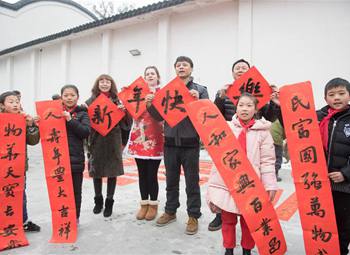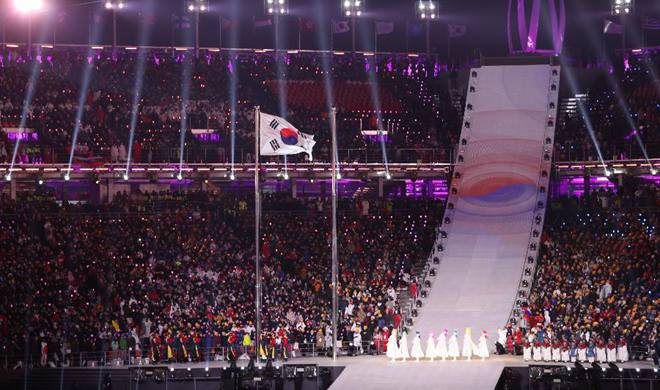by Keren Setton
JERUSALEM, Feb. 9 (Xinhua) -- Israel is perhaps facing less security threat than anytime in the past in its 70-year history. Still, the Jewish state's defense industry is thriving with hi-tech weapons and capabilities attractive to global markets.
Indeed, the peace treaties with Egypt and Jordan leave Israel battling with enemies who do not share its military might. A nuclear threat from Iran has been halted by an international treaty since 2015, and Syria is distracted by a seven-year bloody civil war.
And still, Israel's defense industry is thriving, booming with hi-tech weapons and capabilities. Many innovations from Israeli defense firms are hits.
That is because Israel is continuously on a state of alert, dealing with a decades long low-intensity conflict with the Palestinians, who do not have a traditional army, that has also created the need for solutions to new threats.
Israel is "a country that was born in a war and since then has more or less never stopped being in a war," said Isaac Ben Israel, chairman of the Israel Space Agency and a retired military general.
This is a fertile ground for immediate testing of weapons, said Gilad Alper, head of research at Excellence Nessuah Trust Company.
Alper said that there is zero latency between the lab and the war zone in Israel, where the feedback from the soldiers on the ground is almost instantaneous.
This advantage is huge and unique, Alper noted.
"This is an ongoing improvement process that simply doesn't exist for other countries. They just don't have the know-how or the experience," Alper said.
Israel's small population, approximately 8 million, coupled with mandatory military service for most citizens, means that everyone either has some extent of combat experience or knows someone who does.
Israel is ranked 11th of the 20 biggest arms exporters in the world between 2011-2015, according to the Stockholm International Peace Research Institute (SIPRI), a rank that is disproportionate to Israel's size, one of the smallest in the world.
It is a billion-dollar industry for the country that has managed to capitalize on its conflict-ridden history.
This history has also resulted in a closely knitted network in which there is continuous flow of information and manpower between the military and civilian defense firms.
"Made in Israel" is a good stamp to have when shopping in the defense sector.
"The brand matters, but it is a result of those companies having close ties with the military and therefore always being able to develop something that works and is relevant to the modern battle ground," Alper said.
Israel's small size is also a factor.
"In its bordering countries alone there is 20 times the population of Israel," Ben Israel said. "This forced it to close the quantitative gap ... by making weapons that fit Israel exactly and give it an advantage to close that gap."
Israel's quest for self-reliance came after a bitter lesson in politics was learned -- France imposed a weapons embargo on the Middle East during the 1967 War. It was a severe blow to the Jewish state.
Fast-forward to decades later, Israel is today not only self-reliant on many critical weapons systems, but also a major exporter.
Big Israeli firms in the industry do not specialize in one sub-sector but often span to various sub-categories in an attempt to reach a wider market. This has both a downside and an upside.
"The companies do a lot of things -- more than what a U.S. company of the same size would do," Alper said. "The specialization in various sectors has a negative impact with the operation margin suffering ... but on the other hand, it means you know how to do a lot of things and you always have a better chance of a hitting a blockbuster."
Elbit, one of the largest names in the Israeli defense business, offers products in 17 different sub-sectors.
In addition, Israeli companies have also specialized in upgrading existing platforms that other armies and countries possess, which makes another source of income.
"This is something that became very attractive to armies around Israel that also have budget limitations but want to improve their military," said Alper.
The booming industry most certainly has a role in perpetuating Israel's conflict with the Palestinians.
For every innovation Palestinian militant groups come up with -- comes a hi-tech Israeli response. The Iron Dome system was designed to intercept short-range missiles from Gaza, and reports of a new technology aimed at detecting Hamas tunnels from the same area are cornering the militant organization.
Israeli government's expenditure on defense research and development is also substantial.
"The weight of the defense industry is decreasing. It is being replaced by industries that are based on technologies that perhaps were originally developed for security but have been converted to civilian needs," Ben Israel said. "I hope this continues, because if it does -- it means that the security threat is decreasing."
However, the interdependency between the military and civilian sectors in Israel will all but guarantee the livelihood of the defense industries.
And peace is not really on the agenda in the Middle East.
"The level of threat globally is not declining," said Alper. "The proficiency of Israeli hi-tech is exactly in synch with the way the modern battleground is developing."

















